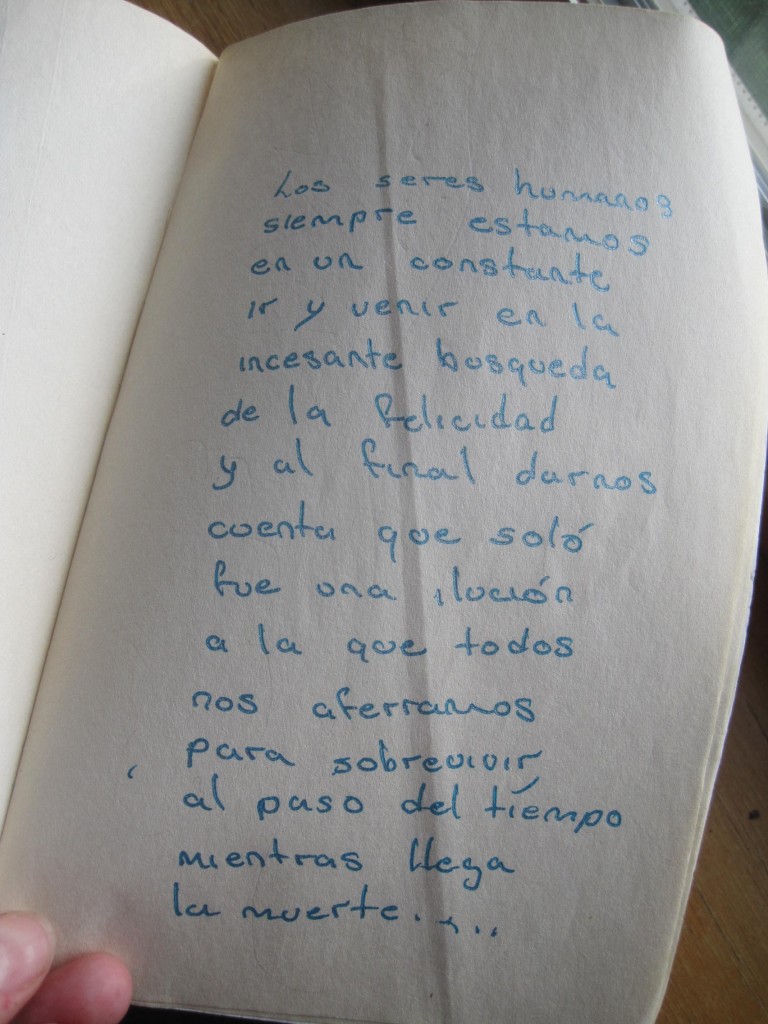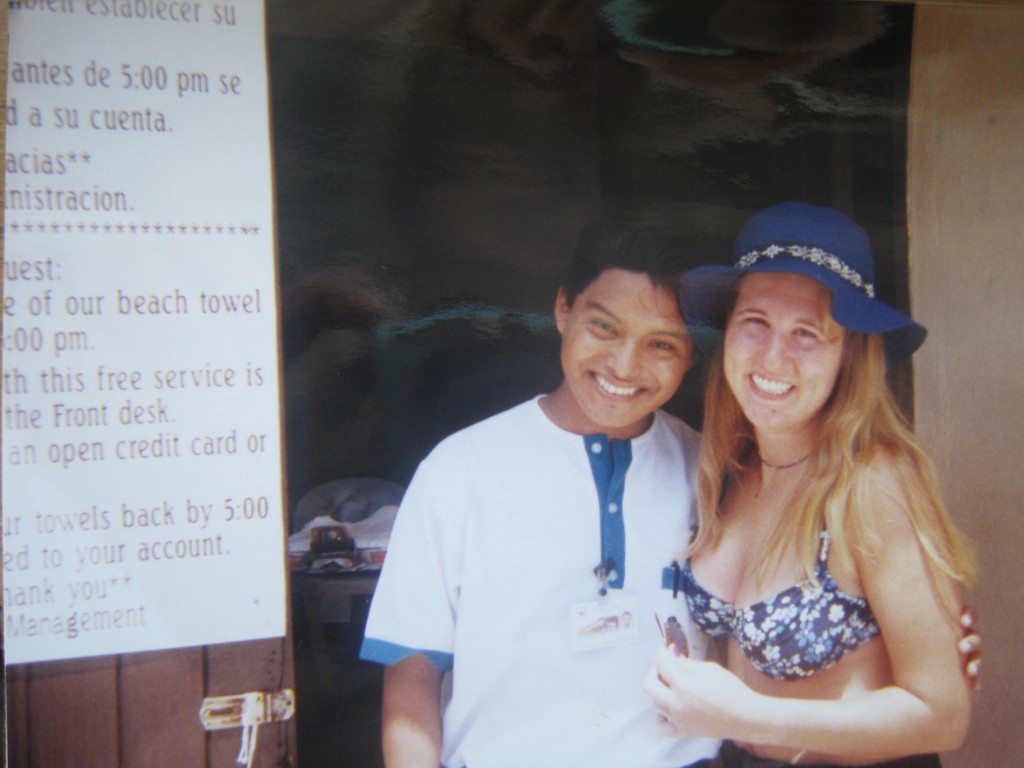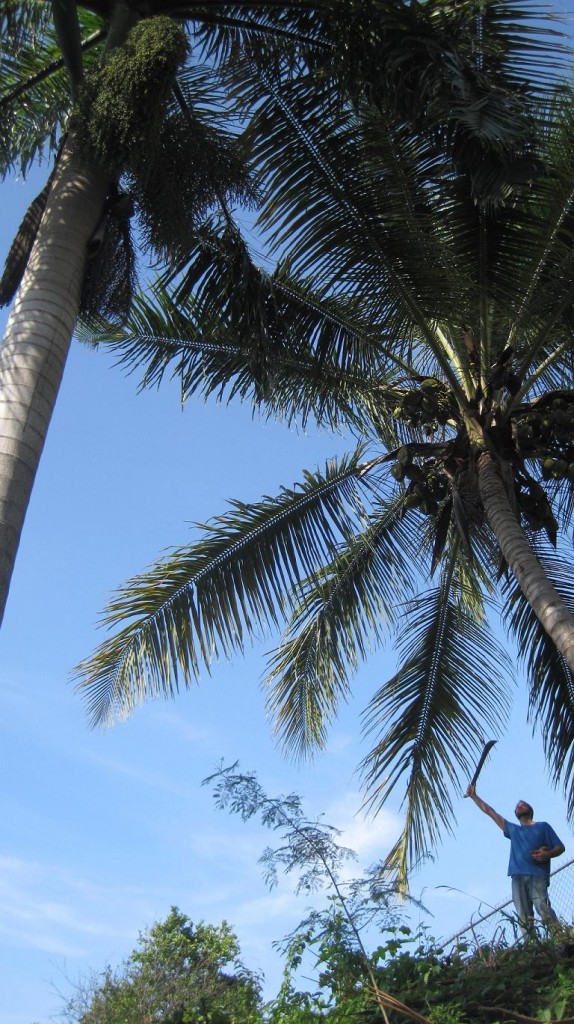I saw this passage written in the back blank pages of a book I was reading (La Casa de los Espiritus). In English it says: We human beings are always in a constant coming and going in the incessant search for happiness and at the end we realize it was just an illusion that hooked us all in order to survive, to pass the time while death arrives. I found it to be remarkably succinct in its existential revelation. And isn’t that ultimately how life is? So why do we try to pretend and cover and deny death?
I also recently read David Foster Wallace’s classic footnote ridden1essay A Supposedly Fun Thing I’ll Never Do Again about his experience on one of the huge luxury cruise ships that sail the Caribbean. While it was very long and drawn out, I found that it captured some of what I have been trying to put into words about the “American Way of Life” that often bothers me, but that I just couldn’t quite pin down and describe.
But I think I have finally boiled it down. It is inauthenticity. It is this pretend world that we live in to deny that we are alive, living beings, and therefore will die. I would argue that for the modern person today, much of our life is inauthentic. In fact, I would go so far as to say it is straight up fake, fabricated, faux, phony. And it is sold to us in neat little packages with great commercial slogans and brands and logos. Our perceptions are marketed and we are told how we are supposed to feel, think and even respond. In the mainstream, we are given choices only in so much of this thing to buy, or that thing to buy.
I think this deep-seated sense of feeling like a number or just one of many “sheeple”, this inauthenticity, is what I feel, but didn’t have words for. This occurs in so many experiences of modern life. Like the time-share spiels where the whole purpose is the sale, and you are the prey. Or Las Vegas, the epitome of fake where a luxurious verdant oasis sprang up from a dead desert-land and where you are herded like cows from one casino to another in a drunken-money sucking haze. Or Disneyland. Or most recent McMansion subdivisions. Or Hollywood Blockbusters blow-em-ups/chick flicks with sneaky in-film product placements. Or how about current mass-produced made-in-China plastic molded toys. Or most pop songs made in a lab with focus groups. Or in mass-produced food-like products, things like Doritos Locos Tacos whose unholy alliance of two multi-billion dollar subsidized “food” companies only points out this unsaid, stifled chuckle of bamboozling the average “consumer” with their chemical crap. And of course, while I have never been on one, I am sure this feeling is most pervasive on most megalines cruise ships. Basically, what I am saying is that in modern American life, this is EVERYWHERE.
Because it is everywhere, it is all the way from the wealthy subculture, the middle class to the so-called “low-brow” and people in poverty. When it comes to selling us an inauthentic life, it is everywhere! And on the rare occasion in this American (or really most industrialized and industrializing countries) life when we do find a truly raw, genuine, authentic experience, it is often taken and wrapped up and resold in shiny, tight cellophane with a barcode and a price tag. Or at the very least, it comes with an advertisement. Cases in point: YouTube who started out raw and real with people just uploading their videos and is now a huge powerhouse of advertisements, the Doors’ unique “Light My Fire” song becoming a Buick ad and really anything of the “counterculture” now has became the mainstream culture. I think this is what we call “selling out”.
Of course, even in all of this fake, false plastic world of airbrushing and air-conditioned gyms there is something real, or authenic to be found. Underneath it all, there is the true story, the story that the sleek ads and fake smiles and shockingly sweet bubbly drinks hide with their chemical preservatives and coats of paint. There are the stories of the people that work in these fake wonderlands of Vegas and Disney and Carnival. There are the photoshop artists behind the ads. There’s the mad food scientist who can make a can of Coke stay shelf-stable for decades.
On my first trip out of the country, my mom took me to Cancun, Mexico to celebrate my graduation from high school and turning 18. We stayed at a resort called Solymar, where the words all run together,or the English equivilent of “Sunandsea”. Anyhow, it was beautiful. We were right on the white-sand beach. The sea gleamed a bright turquoise color, the sun shined its golden gild onto me and we enjoyed the relaxation that a week in the tropics always and forever whence would bring to me.
But most of it was fake. Cancun was not built under normal conditions. It was not a city built by and for its people. It sole purpose was/is a tourist playground. The small sleepy fisherman village had transformed in just a few years into a mega high-rise, MTV-spring-break party town leaving the few remaining locals feeling voiceless and pushed out by the influx of foreign Europeans and North American tourists and corporate money. The fishermen could no longer fish. The locals could no longer even visit their own beaches without the plastic neon bracelets that denoted “tourist”. Only in furtive glances out the hotel bedrooms while cleaning guest rooms or skimming the skum from the pools did the locals-turned-hotel-staff remember that this used to be their quiet beach hideaway.
I learned most of this talking to a “towel boy” at the pool. He was about my age at the time, or around 18. At that time, my Spanish wasn’t very good and his English wasn’t either, but we managed to communicate, because communication is mainly about the desire to be understood. He invited me out to see a movie, but I wanted to learn more about him and his life, not just see some canned American-movie when I was in Mexico for the first time ever.
Together we walked around the less-touristy part of the city and he introduced me to his brother, his sister-in-law and their baby. The four of them lived in an unpainted cement square box or what we could call euphemistically a “studio apartment” about 15×15 feet in size. It was in a clump of about four other similar boxes and the four box-rooms all shared one single toilet and shower. Inside the “studio” there was one double-sized bed and a small kitchenette. I asked where everyone slept. He said the brother and his wife and baby slept in the bed and he hooked up a hammock and slept in that. Though they had very little, they generously shared a meal with me and told me the story of Cancun and their contract to work at the resort and the little measly amount of money (about $10/week and the room) they were paid to work there. It made me feel even better that we hadn’t seen a movie as that would have cost them nearly a week’s pay just for two hours of entertainment.
I still often think of that family struggling to make it in the hot Yucatan tourist trap of Cancun. It made an impact on me because it was under the surface. It was the deeper, hidden part of the shiny brochures inviting the spoiled tourist to “relax, and feel pampered…because you deserve it”. It was the authentic hidden beneath the fake. It was this juxaposition and interplay of the struggle of this small family and the smug, rich, mostly oblivious tourist industry. I had inadvertently peeled off the filmy, flimsy layer of pretty fakeness that covers the sometimes ugly truth. And I loved it. I felt alive and not sold to. I knew, I still know! deep down that I wanted to live an authentic life, choosing and creating as I went along.
And so what do I do with this knowledge of my desire to live an authentic life, a life as close to the real thing as possible (even as Coca Cola tries to steal that from us in its ironic slogan)? I think this undercurrent pull of authenticity is what drives a large part of my life. I love to garden and eat straight from the source, whether that is one of my chicken’s eggs or a peach from my tree in the front yard. I love this authentic feeling of eating straight from the true source so much that we now have four acres of tropical jungle in Puerto Rico to do this very thing! I love meeting and really knowing and helping people, speaking languages and learning about new cultures. I love to listen to raw from-the-heart music. I love to watch indie movies. I love locally-owned small businesses and hand-made products. I read books. I love to be financially independent and not “owned” by someone else.
And in those unavoidable instances of “fauxness” I try and uncover the rawness, the realness that is still there, but obscured by labels and marketing gimmicks, by enhancements and additives. And I try to see through the fads that start out as real and turn fake like organic grains turned BHT-packaged cereal sold in Wal-Mart or indie artists turned corporate brands.
It is hard to see through all the fakeness. Sometimes it seems so real as to be convincing. But usually deep down, I can feel a tug that says this just doesn’t feel like the genuine article. Someone is trying too hard. This isn’t a “real” party or get-together, this is someone trying to sell me something or convince me, or convert me. This isn’t a “real” movie, this is an advertisement disguised as a movie. This isn’t a “real” song, it’s a product jingle. And at the same time, I try and see the good, the real, the humanity and vulnerability underneath even these suspiciously fake moments. I try to enjoy the whole experience of life even if it looks on the surface very artificial. I will try nearly anything once, and usually I can find something that I like about it.
Because after living very long in this fake world, we have probably all been fake at some point. We have tried to be someone we aren’t. We have tried to sell someone on something we really didn’t believe in. We have acted out of character. We have tried to ignore the fakeness or even sort of enjoy it. But underneath it all, we are authenic. We are genuine. We are real. The struggle is staying true to who you really are, deep down in a world that says that fake, pretend-land is better than the real, real thing.
1No, seriously they are some very long and involved footnotes.




Funny reading this great post especially about Cancun while next to it on the right side an advertisement for Sandals vacation is popping up! 🙂 Maybe you shouldn’t have advertisement on this blog? Just a thought. Good luck with your move to PR.
That is a good point. I’m totally not saying we are perfect, or even know what that would really look like, if could even exist. Like I said, it’s a struggle to find our own authenticity.
We try to live as authentically as possible, but that’s not saying a whole lot. We are not trying to be poster children for the authentic life, but rather just start the conversation. Is it even possible? What does that even mean? While we would love to eat from our garden year-round, the fact remains that it is a long, cold winter and probably even in Puerto Rico we will eat store-bought, wrapped-in-plastic foods sometimes. We -or rather I -ha- will highlight my hair and shave my legs and wear makeup to look a little more enhanced than my true, roll-out-of-bed self. I may even go on a cruise someday, and I might even enjoy it. My point in this post is that I know that even in these things there is the humanity and vulnerability behind why we do those.
In having an ad on this site, we are human too. Unfortunately nothing is free including this site. I would rather that it was free, who wouldn’t? It would be much easier to live out our life’s purpose if we didn’t have to worry about surviving- or paying bills or doing laundry. And I don’t like Google’s ads because they are really insidious because they pull up ads related to the text we write (like you seeing a Sandal’s ad because I wrote about Cancun) or sites we’ve visited (using cookies) and pay small websites like this hardly anything at all (only if someone clicks, they say!). And we have little say in what appears!
So, yes, I totally get your point because it does make me feel that same tug of inauthenticity and of being trapped in a no-win situation between a site that can’t support itself and having ads on a site that doesn’t particularly like ads, but especially not ads that aren’t screened or personally approved.
This really points to why this inauthenticity EVERYWHERE. A small band who has a handful of followers will never get to share their music with the masses unless they sign with a big label, but if they sign with a big label they have to do what that label says, which may include doing a gig somewhere they would really rather not play for or smile for some product that they really wouldn’t otherwise promote. They are stuck in the same quandary. A person could try to avoid every store-bought or mass industrialized food available, but would probably starve.
What’s the solution? How do we move to a more authentic life? I think the answer like most things in life is to try and do your best, I suppose. Be honest, as I’m trying to be with you, Just Me, and as you were with me (though, if we are really being honest and authentic, you did hide behind an alias, just saying). We are all trying here. We all need to give each other some slack and be kind. It’s hard out here for the modern person. We’re in this thing together.
And I’ll see what we can do about that ad. 😉
Good point. Ad has been removed.
One of the great things about life in the US is also one of the bad things: we are incredibly rich compared to most of the world’s billions, and some folks figured out they could sell us a lot of “stuff” (you had enlightening articles on fruitfulista on this a while back). Resisting the “stuff” takes work and courage to be different in choosing a lifestyle that is simpler, cleaner, healthier, kinder and more just (as in not taking a cruise ship and ignoring the conditions of the workers or the pollution this industry creates).
Being able to speak foreign languages as an American is rare, so natives love to talk with us. Many times I despaired at what they told us, like you mentioned, being shoved off their land and forced to work for peanuts for the resort industry, or having their governments paid by the US to kill “terrorists” which the indigenous Maya weren’t but the venal local military wanted their nice fertile lands in the high lands; and I could go on but I won’t.
Your post on the authentic life reminds me of yoga, which teaches finding the inner self, the truth of your shape, acceptance of who you are without all the outside imposed judgements, and the acceptance that we are here for a short time with everyone and everything we think is important ending up in the same place (the grave). Nice to see you have grabbed on to this reality and are working to avoid the inevitable conditioning to conform to the masses. Once embraced, this philosophy is freedom itself; however, as the old Chinese saying goes, “chopping wood, hauling water, after enlightenment, chopping wood, hauling water.”